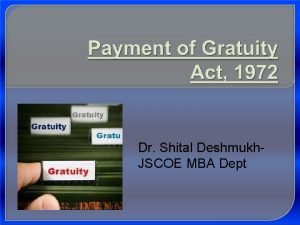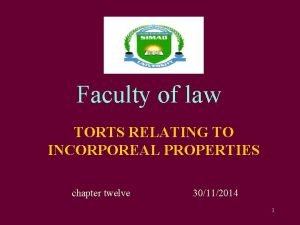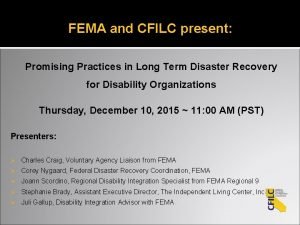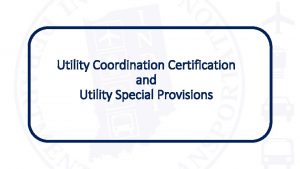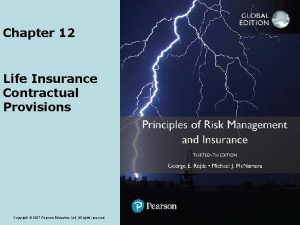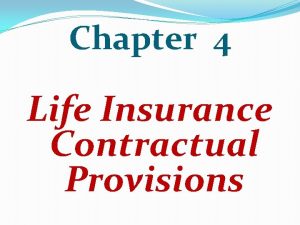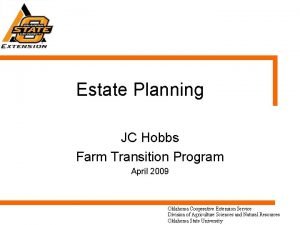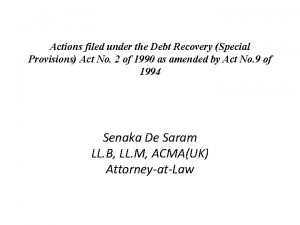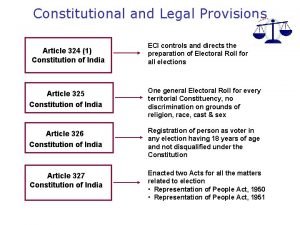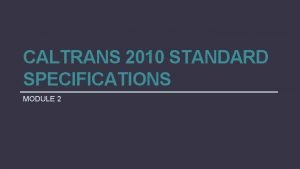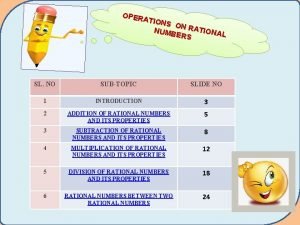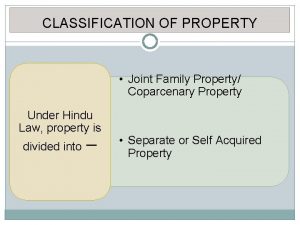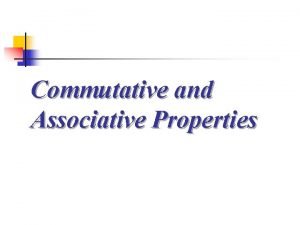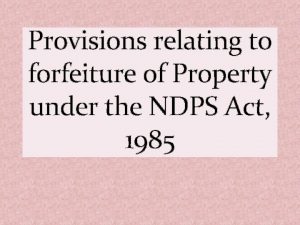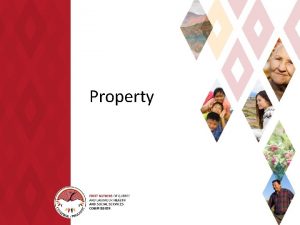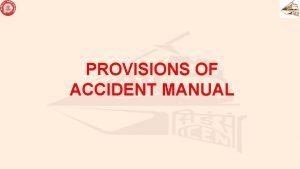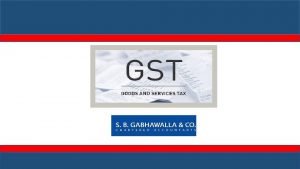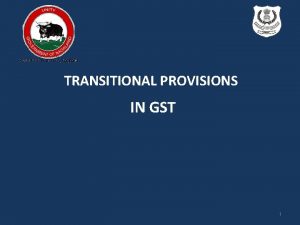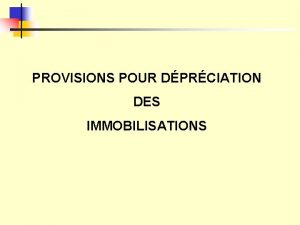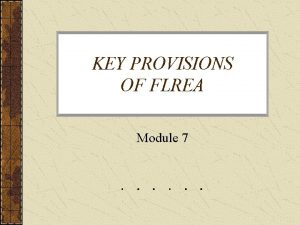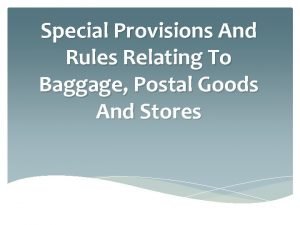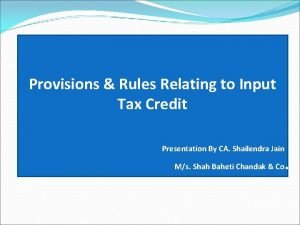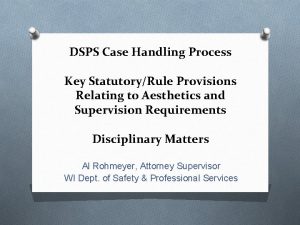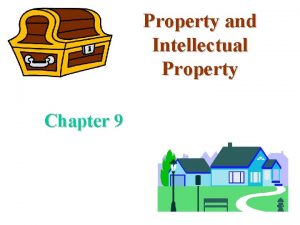Provisions relating to forfeiture of Property under the



















































- Slides: 51

Provisions relating to forfeiture of Property under the NDPS Act, 1985

Chapter - VA A new Chapter introduced vide NDPS (Amendment) Act, 1988. Comprehensive provisions regarding tracing, identifying, seizure or freezing and forfeiture of illegally acquired property. Further amended by NDPS (Amendment) Act, 2001.

Prohibition of activities Conversion or transfer of illegally acquired property for the purpose of concealing or disguising its illicit origin or providing assistance in the commission of offence. Conceal or disguise the true nature, source, location, disposition of such property.

Acquire, possess or use of such property. Person must have knowledge regarding its origin that the property has been derived from an offence committed under the Act or under corresponding law of any other country, or from an act of participation in such offence

Procedure for Forfeiture Checking applicability of provisions. Identifying the properties. Passing freezing orders.

Procedure for Forfeiture Sending to Competent Authority for Confirmation. Right of affected person to approach Appellant Authority. Forfeiture order to be passed on Conviction.

To whom the provisions of Chapter VA apply ? A person convicted of an offence punishable with imprisonment for a term of ten years or more. A person convicted of a similar offence by a competent Court of criminal jurisdiction outside India. A person against whom an Order of detention has been made under the PITNDPS Act or the J&K PITNDPS Act of 1988

- The detention Order has not been revoked on the report of the Advisory Board. - The detention Order has not been set aside by a court of competent jurisdiction.

A person who has been arrested or against whom a warrant or authorisation of arrest has been issued for - commission of offence punishable with imprisonment for a term of ten years or more. - commission of similar offence corresponding law of any other country under

Relative of such person Associate of such person Present holder of property which was previously held by such person - unless the present holder (or any one who held before him and after such person ) is a transferee in good faith for adequate consideration

Who is a relative ? Person Lineal ascendant descendant Brother / Sister Spouse Lineal ascendant Brother / Sister Spouse descendant Spouse Lineal ascendant

Who is an Associate ? who had been or is residing in the residential premises including out houses of such person who had been or is managing the affairs or keeping the accounts of such person

– Association of persons, body of individuals, partnership firm or private company within the meaning of Companies Act, 1956, where such person had been or is a member, partner or director. – Who had been or is keeping accounts or managing affairs of the above.

Any other member, partner or director of the above at the time when such person had been or is a member partner or director. Trustee of a trust created by such person or where total contribution by such person to the trust is not less than twenty percent of value of asset. Competent Authority considers anyone holding property on such person’s behalf.

What is illegally acquired property ? Must have been acquired in contravention of any provisions of the Act. Acquisition should be within 6 yrs from the date of the offence. Wholly or partly out of or by means of incomes, earnings or assets derived or obtained from or attributable to such contravention.

Wholly or partly traceable to above or the income or earning from such property Any property held by such person which would have been illegally acquired property in relation to any previous holder Any property acquired by such person wholly or partly traceable to property above or income and earning there from.

Competent Authority Any Commissioner of Customs or Central Excise or Income Tax or officer of equivalent rank of Central Government. Has to be authorised by Central Government to perform the function of Competent Authority (C. A. ) under Chapter VA.

Sl No Competent authority States 1 Kolkata West bengal, Orissa, Sikkim, Andaman & Nicobar islands and NE states. 2 Delhi 3 Mumbai Maharashtra, Goa, Daman Diu, Gujrat, Madhya Pradesh, Chattisgarh 4 Chennai Tamil Nadu, Kerala, Andhra Pradesh, Karnataka, Lakshwadeep, Pondichery 5 Lucknow Utter Pradesh, Utteranchal, Bihar, Jharkhand Delhi, Himachal Pradesh, Harayana, Punjab, J& K

Jurisdiction Where, address/residence of detenu, convict or person arrested or against whom authorisation or warrant of arrest has been issued, falls. Where sponsoring/investigating agency is located (in case of more than one address). Where the person is detained or charged (if no address is found). Where illegally acquired property is located (in case of person who has been similarly proceeded against outside India).

PROCEDURE FORFEITURE OF PROPERTY

Prohibition Holding of illegally acquired property by a person to whom Chapter VA applies is prohibited. Property may be held by himself or through any other person on his behalf. Such property shall be liable to be forfeited to the Central Govt. .

Property can not be forfeited if acquired before a period of six years from relevant date : – Date of arrest. – Date on which a warrant or authorization of arrest has been issued. – Date on which Preventive detention order was issued.

Identification Officer empowered under Section 53 of NDPS Act and officer-in-charge of Police Station has the power to proceed to trace and identify illegally acquired property. May proceed on receipt of information regarding holding of illegally acquired property by a person to whom Chapter VA applies. Reasons to be recorded in writing before proceeding.

The empowered officer may conduct inquiry, investigation or survey in respect of any person, place, property, assets, documents, books of account etc. Competent Authority may issue directions or guidelines with regards to inquiry, survey or investigation.

Seizure/Freezing Empowered officer must have reason to believe that it is illegally acquired property Such property is likely to be transferred or concealed or otherwise dealt with If the property can not be seized, the officer may freeze ie prohibit transfer or otherwise dealing with property without his permission or permission of C. A.

A copy of the order to be served on concerned person. Another copy must be sent to C. A. within 48 hours of its being made. Order to be confirmed by C. A. within 30 days of its being made to have any effect.

Officer must establish connecting link between the properties of relatives and associates and the convict/detenu. Nexus between acquired property and illegal activity of its owner is presumed in case of disproportionate assets. C. A. to observe principle of natural justice while confirming the order of freezing/seizing. Copy of confirmation to be served on the affected person.

Forfeiture of property proceedings may be initiated by the CA if the accused is convicted or detained successfully under PIT NDPS Act. Notice issued by CA to such persons based on the report/freezing order from investigation or otherwise officer conducting

Notice may be served on the person to show cause within 30 days. Copy of notice also to be served on person who is holding property on the person’s behalf.

In case of persons arrested or against whom warrant or authorisation of arrest has been issued under the Act or under corresponding law of any other country, no notice forfeiture. No notice can be issued to such person’s relative, associate or holder of property which was previously held by such person.

Forfeiture C. A. must consider explanation of the affected person and all materials placed before him. must give the affected person or the person who is holding property on his opportunity of being heard. behalf, a reasonable must record findings whether all or any of the properties are illegally acquired properties.

After recording findings that any property is illegally acquired property, C. A. declares that the property stands forfeited to Central Government. C. A. may proceed ex-parte, if the person does not appear before him or represent his case it within 30 days For ex-parte declaration, C. A. has to record findings on the basis of available evidence.

Burden of Proof Burden of proving that any property is not illegally acquired property lies on the person affected. Options to pay fine -Sourceofpartofillegallyacquiredpropertyhas not been proved to the satisfaction of C. A. - C. A. orders payment of fine in lieu of forfeitures after giving reasonable opportunity of being heard. - If fine is paid, declaration of forfeiture is revoked and property stands released.

Properties of Trust Notice is served on the author of the trust or on the contributor of assets and the trustees – To show cause within 30 days to explain source of money or other assets or contribution made – Same procedure to be followed by C. A. as in case of notice issued with respect to other illegally acquired properties

Transfer to be null and void – Transfer of property by any mode in respect of which seizing/freezing order has been issued or notice has been served by C. A. shall be ignored. – Once property stands forfeited, such transfer becomes null and void.

Management of Properties Administrator, not below the rank of Joint Secy. , appointed by Central Govt. to receive and manage property seized or forfeited. He may also take measures to dispose of forfeited property. Manner prescribed in the Illegally Acquired Property (Receipt, Management and Disposal) Rules, 1989.

Appellate Tribunal for forfeited property has been set up by the Central Govt. It consists of Chairman and Members, Chairman shall be a person who is or has been or is qualified to be a judge of S. C. or H. C; Members not below the rank of Joint Secy. Tribunal to hear appeals against orders of seizing/freezing, notices issued by C. A. , orders of forfeiture and imposition of fine in lieu of forfeiture.

Appeals Any aggrieved officer mentioned in Sec 68 E(1) or any aggrieved person may appeal. Appeal may be preferred within 45 days (subject to maximum 60 days) from the date of service of order. Appellant is given an opportunity of being heard. Tribunal may confirm, modify or set aside the order appealed against.

Powers and functions of Appellate Tribunal may be exercised and discharged by Benches consisting of three members constituted by Chairman may constitute a Bench of two members for the purpose of expeditious disposal of appeals In case of difference on any point between two member, Chairman may refer to the third member Parties to appeal can inspect documents or take copies on payment of fees

Power to take possession Property has been declared to be forfeited by C. A. Property in respect of which affected person has failed to pay fine in lieu of forfeiture. C. A. may order the person affected or any person who is in possession to surrender or deliver possession of such property to Administrator or to any person authorized by C. A. within 30 days of service of order. In case of failure to comply, Administrator may take possession by use of force. Service of police officer may be requisitioned and it shall be duty of such officer to assist.

Powers of C. A. & Tribunal C. A and Appellate Tribunal shall have all powers of a Civil Court w. r. t. - Summoning and enforcing the attendance of any person and examining him on oath. - requiring the discovery and production of documents - receiving evidence on affidavits - requisitioning any public record or copy thereof from any court or office - examination of witnesses or documents

Information and assistance to C. A. : C. A. has the power to require any officer or authority of the Central Government or a State Government or a local authority to furnish information Certain officers may furnish suo motu information available with them to C. A. They are empowered and required to assist Administrator, C. A. and Tribunal

The officers of NCB/Customs/Central Excise/Income Tax/FERA/Police/Narcotics/ CEIB/DRI/Sales Tax/Commercial Tax/ Forest Dept. , Administrator/Executive officers of local bodies, Collector/DM/ Supdt. of Jail, Registrar/Sub -registrar of district, etc. are empowered and required to assist C. A. , Tribunal and Administrator

Bar of jurisdiction: No Civil Court shall have jurisdiction over matters which Tribunal or C. A. is empowered to determine. No injunction shall be granted by any Court or other authority in respect of any action taken or to be taken No order passed or declaration made shall be appealable except as provided. Findings under other laws: No finding of any officer or authority under any other law shall be conclusive for the purpose of proceeding under Chapter VA.

Rectification C. A. or Tribunal may rectify any mistake apparent from record. Amendment of any order is to be made within a period of one year from the date of order. Person to be given reasonable opportunity of being heard, if amendment is likely to affect him prejudicially. Tribunal or C. A. can not pass an order afresh while rectifying any mistake

Service Notice or order issued to be served by person or his agent. - affixing on a conspicuous place in the property on part of the premises in which the person is known to have last resided or carried on business or personally worked for gain.

Punishment Person acquires property knowing that proceedings under Chapter VA are pending. Punishment is up to 5 years of imprisonment and fine up to Rs. 50, 000/-

Release of Property Seized or frozen property stands released, if detention order of a detenu is set aside or withdrawn. If a person has been acquitted or discharged from the charges under the Act or under corresponding law of any other country and the acquittal was not appealed against, or when appealed against, was disposed of, property seized or frozen stand released.

Warrant of arrest or authorisation of arrest has been withdrawn, property seized or frozen stands released

The sale proceeds of any property forfeited under Chapter VA of NDPS Act are credited to the National Fund for Control of Drug Abuse constituted by Central Govt. to combat illicit traffic, control and prevent drug abuse, identify, treat and rehabilitate addicts and educate public against drug abuse

 Wdrf
Wdrf Forfeiture of gratuity
Forfeiture of gratuity Torts relating to incorporeal personal property
Torts relating to incorporeal personal property Provisions of fema act 1999
Provisions of fema act 1999 Utility coordination
Utility coordination Life insurance contractual provisions
Life insurance contractual provisions Life insurance contractual provisions
Life insurance contractual provisions Life insurance contractual provisions
Life insurance contractual provisions New hobbs farm and provisions
New hobbs farm and provisions Note three ways u.s. occupation changed japan.
Note three ways u.s. occupation changed japan. Define decree nisi
Define decree nisi 2015 nehrp recommended seismic provisions
2015 nehrp recommended seismic provisions Article 325
Article 325 Fidelity personal trust company fsb
Fidelity personal trust company fsb Esf+ regulation
Esf+ regulation Caltrans standard plans 2010
Caltrans standard plans 2010 Distributive property in division
Distributive property in division Obstructed heritage in hindu law
Obstructed heritage in hindu law Classification of property under hindu law
Classification of property under hindu law Associative property vs commutative property
Associative property vs commutative property Chemical and physical properties
Chemical and physical properties điện thế nghỉ
điện thế nghỉ Một số thể thơ truyền thống
Một số thể thơ truyền thống Thế nào là hệ số cao nhất
Thế nào là hệ số cao nhất Trời xanh đây là của chúng ta thể thơ
Trời xanh đây là của chúng ta thể thơ Ng-html
Ng-html Số nguyên tố là số gì
Số nguyên tố là số gì đặc điểm cơ thể của người tối cổ
đặc điểm cơ thể của người tối cổ Fecboak
Fecboak Các châu lục và đại dương trên thế giới
Các châu lục và đại dương trên thế giới Chụp tư thế worms-breton
Chụp tư thế worms-breton ưu thế lai là gì
ưu thế lai là gì Hệ hô hấp
Hệ hô hấp Tư thế ngồi viết
Tư thế ngồi viết Cái miệng bé xinh thế chỉ nói điều hay thôi
Cái miệng bé xinh thế chỉ nói điều hay thôi Cách giải mật thư tọa độ
Cách giải mật thư tọa độ Bổ thể
Bổ thể Tư thế ngồi viết
Tư thế ngồi viết V cc
V cc Thẻ vin
Thẻ vin Thơ thất ngôn tứ tuyệt đường luật
Thơ thất ngôn tứ tuyệt đường luật Chúa yêu trần thế
Chúa yêu trần thế Các châu lục và đại dương trên thế giới
Các châu lục và đại dương trên thế giới Sự nuôi và dạy con của hổ
Sự nuôi và dạy con của hổ Từ ngữ thể hiện lòng nhân hậu
Từ ngữ thể hiện lòng nhân hậu Diễn thế sinh thái là
Diễn thế sinh thái là Vẽ hình chiếu vuông góc của vật thể sau
Vẽ hình chiếu vuông góc của vật thể sau Phép trừ bù
Phép trừ bù Tỉ lệ cơ thể trẻ em
Tỉ lệ cơ thể trẻ em Lời thề hippocrates
Lời thề hippocrates đại từ thay thế
đại từ thay thế Quá trình desamine hóa có thể tạo ra
Quá trình desamine hóa có thể tạo ra

